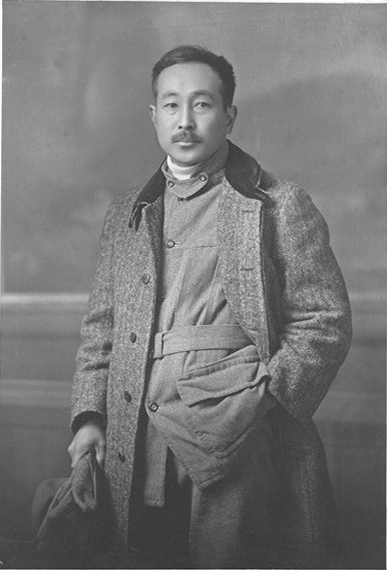- Takeo Arishima
Infobox Writer
name = Takeo Arishima

caption = Takeo Arishima
birthdate =4 March 1878
birthplace =Tokyo ,Japan
deathdate =9 June ,1923 )
deathplace =Karuizawa, Nagano ,Japan
occupation = Writer
genre = short stories, novels, essays
movement = "Shirakaba "
notableworks =
influences =
influenced = Nihongo|Takeo Arishima|有島 武郎|Arishima Takeo|4 March 1878 –9 June ,1923 was a novelist, short-story writer and essayist during the late Meiji and Taishō periods. His two younger brothers, Nihongo|Ikuma Arishima |有島生馬 and Nihongo|Ton Satomi |里美弴 were also authors.Early life
Arishima was born in
Tokyo into a wealthy family as the son of an ex-samurai official in the Ministry of Finance. He was first sent to a mission school inYokohama , where he was taught English, after which he entered preparatory school of the prestigiousGakushuin peer's school, when he was 10 years old.After he graduated from the Gakushuin at age 19, he entered the
Sapporo Agricultural College (the present-day Faculty of Agriculture atHokkaido University ). During his studies at the university, he attemptedsuicide with Nihongo|Kokichi Morimoto |森本厚吉, who later went on to establish several women's schools in Japan. The suicide failed, and Arishima subsequently became influenced byUchimura Kanzō and became aChristian in 1901.After graduation and a mandatory short stint in the
Imperial Japanese Army , Arishima took English lessons from Mary Elkinton Nitobe,Inazo Nitobe 's wife, and in July 1903, he obtained a position as a foreign correspondent in theUnited States for theMainichi shimbun . In theUnited States he enrolled atHaverford College (aQuaker institution outside ofPhiladelphia ) and laterHarvard University . After graduation, he briefly worked in an insane asylum operated by the Quaker sect. He recorded his experiences from his journey to America in his diary.During his time in America, he became critical towards
Christianity , attracted tosocialism , and influenced by the works of writers such asWalt Whitman ,Henrik Ibsen , andPeter Kropotkin . His time and experiences in America and subsequent year in Europe also profoundly influenced his writing style and his outlook on the world, resulting in feelings of alienation from Japanese society.After he returned to Japan in 1907, he reentered the army briefly before becoming an English and ethics teacher in 1909 at his alma mater.
Literary career
Through his brother Arishima Ikuma, he also became acquainted with authors who graduated from the Gakushuin, including
Naoya Shiga andSaneatsu Mushanokōji . Arishima and these writers formed a group, which was named after their literary magazine "nihongo|Shirakaba "|白樺|White Birch, which was first published in 1911. He wrote novels and criticisms and was known as one of the central figures in the Shirakaba group.In 1909, Arishima published his best-known work: nihongo|A Certain Woman|或る女|Aru Onna, a moral and psychological melodrama about a strong-willed woman struggling against a hypocritical male-dominated society. In this work, and in subsequent novels, such as nihongo|"The Descendents of Cain"|カインの末裔|Kain no Matsuei (1917) he depicts God’s curse on both man and nature through the eyes of a self-destructive tenant farmer. While critically acclaimed for his style, the themes and characters of Arishima’s works did not appeal to many contemporary Japanese readers.
Later life
In 1922, Arishima implemented the socialist philosophy he had been developing by renunciation of the ownership of a large
tenant farm in Hokkaido, which he had inherited from his father, publicly stating that he wanted to distance himself from thepetit bourgeois in the coming revolution.Arishima married in 1910, but his wife died in 1916 of
tuberculosis leaving him three children. In 1922, Arishima met Akiko Hatano, a married woman and an editor working for the "Fujin Koron", a famous women's magazine. Their relationship quickly developed into an extramarital affair, which came to be known by Hatano's husband. This led to Arishima and Hatano committing suicide in Karuizawa by hanging themselves.Legacy
After his death, Arishima became known for his detailed diaries, covering more than twenty volumes, with an intimate record of his life, fears and hopes. His contemporaries regarded Arishima as a philosopher and social critic as much as a novelist. His writing was critical of Christianity and strongly influenced by socialism; emotionally intense, humanistic, and employed ideas from the
Bible ,Tolstoy , and anarchic socialism.Arishima's major works include:
*"Aru Onna" ("A Certain Woman ") 1919
*"Oshiminaku Ai wa Ubau" ("Love Robs without Hesitation")
*"Kain no Matsuei" ("Descendant of Cain") 1917Available in English
* "A certain woman". ISBS (1978). ASIN: B0006E0Y5Q
* "Labyrinth". Madison Books (2000). ISBN 0819182931
* "The agony of coming into the world". Hokuseido Press (1955). ASIN: B0006AV8GEReferences
* Anderer, Paul. "Other Worlds: Arishima Takeo and the Bounds of Modern Japanese Fiction". Columbia University Press (1985). ISBN 0231058845
* Morton, Leith. "Divided Self: A Biography of Arishima Takeo". Harry Ransom Humanities Research Center (1989). ISBN 0043780067External links
* [http://www.aozora.gr.jp/index_pages/person25.html Arishima Takeo page] at
Aozora Bunko
* [http://www.findagrave.com/cgi-bin/fg.cgi?page=gr&GRid=6617180 Arishima Takeo's biographic sketch] atFind A Grave
* [http://www.town.niseko.hokkaido.jp/arishima/ Arishima Takeo Memorial Museum in Niseko, Hokkaido (Japanese site)]
Wikimedia Foundation. 2010.
